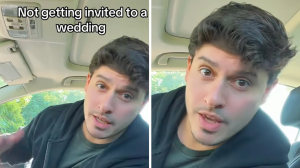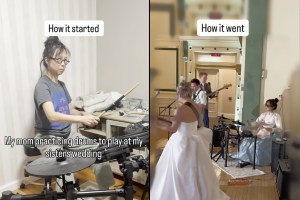This past week, one tired old idiom resurfaced to unprecedented attention.
Sen. Chris Coons (D-DE) said it when he addressed Dr. Christine Blasey Ford.
The Atlantic featured it prominently in a recent story.
In an interview, Supreme Court Justice Ruth Bader Ginsburg, speaking into her lap, recalled how she, and “every woman of [her] vintage,” found themselves tyrannized by it.
The Guardian, PBS, CNN, Quartz, Dictionary.com, Merriam Webster, UrbanDictionary.com, Huffington Post, The Weekly Standard, Christian Science Monitor, Psychology Today: all have think pieces or definitions to contribute.
The idiom, of course, is “Boys will be boys.” And all its attendant cultural noise forced me to think: What about its natural, largely unused counterpart: “Girls will be girls?”
Unlike “Boys will be boys,” which crowds my mind with behaviors ranging from rowdiness to rape, “Girls will be girls,” virtually empties it.
When I try to make it mean something, a blank unfolds in my brain—a kind of prolonged end-of-gong silence.
When I Google “Girls will be girls,” the first and most prominent hit is a 2003 drag comedy—a campy romp that mostly mines humor from a time-honored sight gag: men dressed as women. Of ten results on Google’s first page, this minor movie occupies eight. The other two: an online clothing boutique featuring items like ‘Sabrina python mini dress’ and ‘Nicole leopard palazzo jumpsuit,’ and a forgettable pop song by a young artist named Sophie Beem (in the YouTube image, Ms. Beem stands limply—dead-eyed, gape-mouthed—in a midriff-baring school uniform.)
Remarkably, not one result remotely addresses female behavior (whatever that means).
Come-hither schoolgirls, sexy jungle jumpsuits, men in drag: this is still the realm of “Boys will be boys,” in service to the male gaze, and, well, the male gays.
So, I narrow my search, add “idiom” to the phrase, and enter a refreshingly nerdy corner of the internet, occupied mostly by grammar forums, where I discover this gem, on stackexchange.com, contributed by an anonymous user:
It seems “Boys will be boys” is a well established idiom and, according to Cambridge Idioms Dictionary, 2nd ed… it is, “something that you say which means it is not surprising when boys or men behave in a noisy, rude, or unpleasant way.”
So I began to wonder if “Girls will be girls” is a phrase that begins to take on an idiomatic meaning in English. Is it so?
To which a user responds:
Excellent question but, no, GWBG is only a derivative, jocularly replacing girls for boys, because culturally girls don’t act like boys at all. …GWBG does not stand alone in meaning by itself — its meaning depends on its connection with BWBB.
As an expression, “Girls will be girls,” a bit like Pop-Star Sophie, doesn’t stand so well on its own. “Girls will be girls” is the linguistic equivalent of our most powerful gender-related narratives—from Eve to Echo to Galatea—that reinforce our most damaging patriarchal myth: that men exist independently of women, but women require men to exist.
Suddenly, I understood why “Girls will be girls” —as a phrase—made my mind blank. That blankness did not, as I assumed, signify a lack of meaning. The silence, the blankness—was the meaning.
“Girls will be girls” means reducing oneself to a blank upon which “Boys” can more easily project their desires. “Girls will be girls” means calcifying into the silent wife-face who watches her husband from the back of a courtroom, stands beside him as he confesses his affairs, or witnesses him take oath for office. “Girls will be girls” means voiding yourself, transforming yourself into an empty space for “Boys” to invade, occupy, and destroy.
To those, including our shameful President, who doubt, even mock, Dr. Ford’s testimony—to those who believe if she’d truly fled the house in severe distress, someone would have noticed; to those who find it suspect she kept quiet for 36 years, and if she’d truly been assaulted, she’d have reported it: that’s not how this works. Brett Kavanaugh was a “Boy” that night—loud, brutal, self-obsessed—and, in turn, Christine Blasey Ford was a “Girl”—mute, blank, invisible.
This is what women are doing when they bravely speak their truth—when they loudly protest the status quo, clamor for justice in public squares, and corner Senators in elevators: they are refusing to be “Girls.” They are annulling their end of a corrupt bargain, in which they are expected to take responsibility for the actions of others, and clap their own hands over their own mouths. Because the accepted patriarchal narrative—about boys existing independently of girls—is wrong. The opposite is true. Without girls who are “Girls”—without that roaring collective silence— boys who are “Boys” will cease to exist.

































